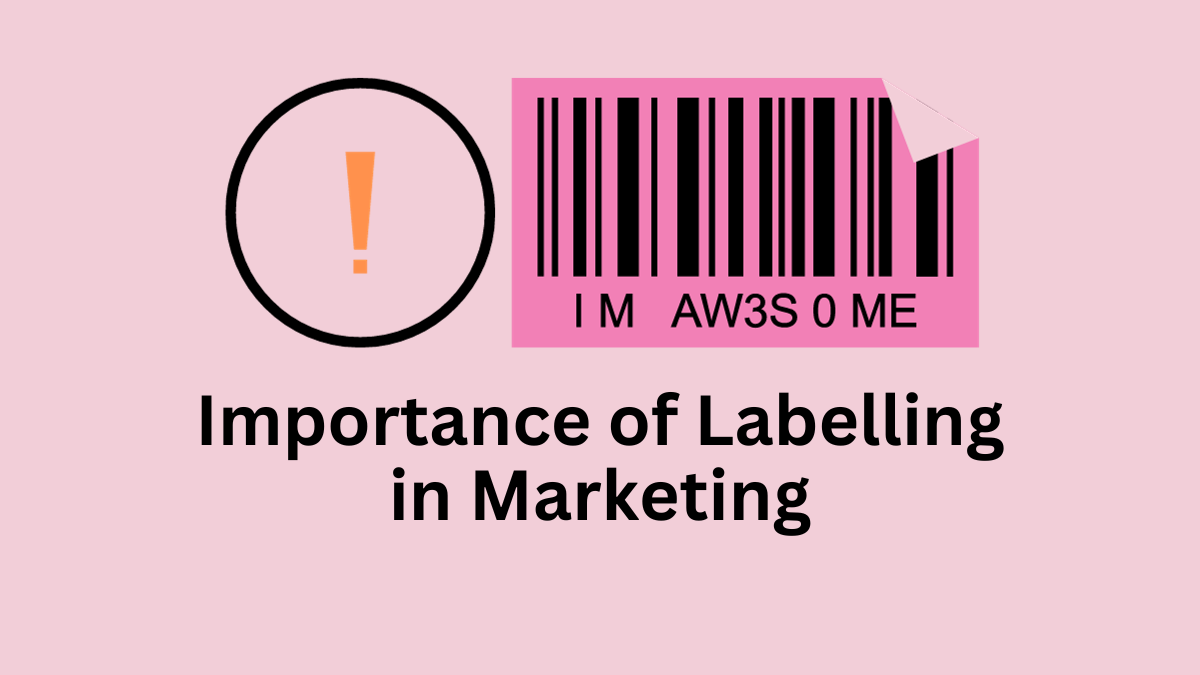Importance of Labelling
Product labelling is the key to giving proper details to product packaging. Here are the 10 major importance of product labelling in marketing:
Product Identification
Labelling plays a crucial role in product identification by providing essential details such as brand name, product type, and manufacturer information. It helps consumers easily recognize and differentiate the product from similar items on the market shelves.
In a crowded marketplace, distinct labelling ensures that customers can quickly identify the specific product they intend to purchase. For example, a well-designed label on a soft drink bottle includes the brand logo, flavour, and size, enabling consumers to identify their preferred choice effortlessly.
Brand Promotion
Product labelling serves as a powerful tool for brand promotion and marketing. A carefully designed label with attractive graphics, logos, and taglines creates brand recognition and loyalty among consumers. It communicates the brand’s values and messaging to the target audience.
An eye-catching label can attract potential customers, leading to increased sales. For instance, renowned companies like Apple and Coca-Cola have iconic labels that not only identify their products but also contribute significantly to their brand image and market presence.
Legal Compliance
Labelling ensures legal compliance by including mandatory information required by regulatory authorities. This may include nutritional facts, ingredients, expiration dates, and safety warnings. Meeting these legal obligations protects both consumers and manufacturers.
For example, food products are required to display nutritional information, enabling consumers to make informed dietary choices and promoting transparency in the food industry.
Read More: 10 Strategies For Product Packaging
Consumer Information
Labelling provides consumers with crucial information about the product’s usage, care, and safety precautions. Detailed instructions, dosage guidelines, and warnings are essential components of labelling, especially for pharmaceuticals and household products.
Clear labelling helps consumers understand how to use the product effectively and safely, preventing misuse or accidents. For instance, medication labels include dosage instructions and potential side effects, ensuring patients use the medication correctly.
Quality Differentiation
Labelling plays a key role in communicating the quality and unique features of a product. High-quality products often have distinct labels that highlight premium ingredients, manufacturing processes, or certifications. Customers can easily identify superior products based on the information provided on the label.
For example, organic food products are labelled with certifications indicating they are free from pesticides and chemicals, helping health-conscious consumers make informed choices.
Read More: 10 Importance of Product Packaging
Marketing and Advertising
Labelling is a cornerstone of marketing and advertising strategies. Well-designed labels with eye-catching graphics, appealing fonts, and compelling taglines create brand recognition. A visually appealing label not only attracts customers but also conveys the brand’s identity and message effectively.
For example, the iconic Coca-Cola label with its distinctive red color and unique font is instantly recognizable worldwide. In a competitive market, a visually appealing label can significantly influence a customer’s purchasing decision, making it a crucial aspect of marketing and advertising efforts.
Safety Warnings
Safety warnings on labels are paramount, especially for products that pose potential risks, such as pharmaceuticals, cleaning agents, or electrical appliances. Clear and concise safety instructions and warnings ensure that consumers use the product safely and responsibly.
For instance, medication labels provide information on dosage, potential side effects, and interactions with other drugs. Safety warnings not only protect consumers from harm but also shield manufacturers from legal liabilities, making them a critical component of labelling.
Read More: 5 Essentials of Good Packaging
Allergy Information
Labelling plays a pivotal role in informing consumers about potential allergens present in food products. Individuals with food allergies or intolerances rely on labels to make safe choices.
Clearly stating allergens like nuts, gluten, dairy, and shellfish enables consumers to avoid products that could trigger severe allergic reactions. Accurate allergy information promotes public health and ensures consumer safety, making it an essential element of labelling, particularly in the food industry.
Nutrition Information
Nutrition labels supply comprehensive data about a product’s nutritional composition, encompassing details on calories, fats, carbohydrates, proteins, vitamins, and minerals. Health-conscious consumers utilize this data to make well-informed dietary selections, manage their calorie intake, and meet specific nutritional requirements. By presenting nutrition information, labels empower individuals to make healthier food choices, contributing to the enhancement of public health and overall well-being.
Read More: 10 Key Functions of Packaging
Adherence to Industry Norms
On our list of 10 importance of labelling, adherence to industry norms is the last one. It ensures products conform to industry-specific norms and regulations. Products displaying certifications and affirming compliance with industry standards inspire consumer confidence.
For example, labels on organic products exhibit certifications signifying that the items meet the criteria for organic farming practices, guaranteeing they are free from harmful chemicals and pesticides. Adhering to industry standards not only guarantees product quality and integrity but also nurtures trust between consumers and businesses.
Read Next: The 4 Ps of Marketing Mix: Product, Price, Place, and Promotion
Arti Kushmi holds a BBS (Bachelor in Business Studies) degree and shares her business and marketing knowledge through this website. While not writing she will be reading and enjoying the moment.
